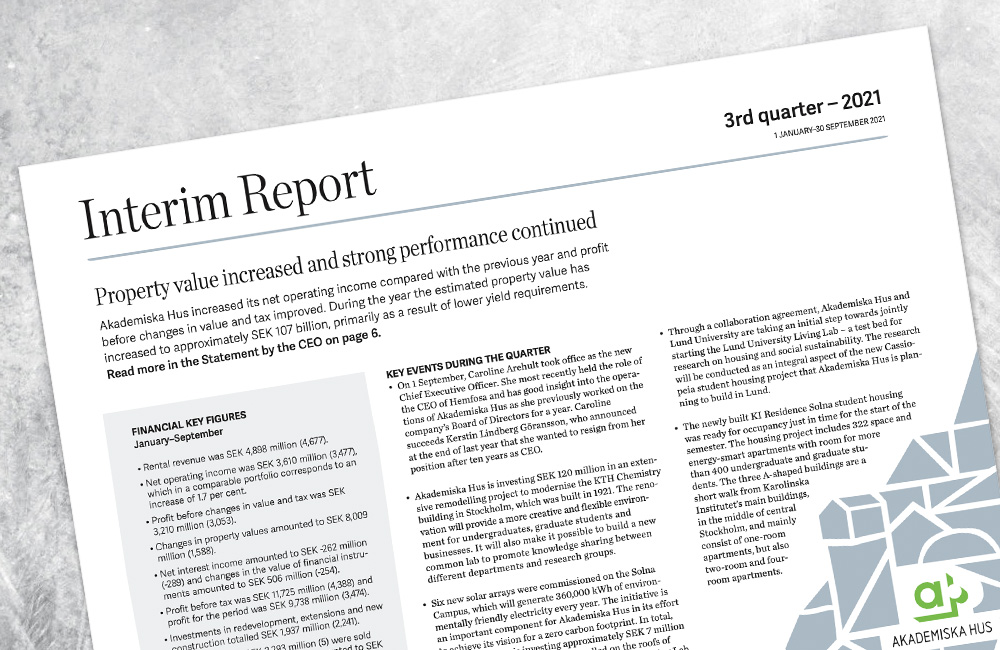Akademiska Hus Interim Report 1 January–30 September 2021
Wednesday, 27 October 2021
Akademiska Hus increased its net operating income compared with the previous year and profit before changes in value and tax improved. During the year the estimated property value has increased to approximately SEK 107 billion, primarily as a result of lower yield requirements.
Interim Report in brief
- Rental revenue was SEK 4,898 million (4,677).
- Net operating income was SEK 3,610 million (3,477), which in a comparable portfolio corresponds to an increase of 1.7 per cent.
- Profit before changes in value and tax was SEK 3,210 million (3,053).
- Changes in property values amounted to SEK 8,009 million (1,588).
- Net interest income amounted to SEK -262 million (-289) and changes in the value of financial instruments amounted to SEK 506 million (-254).
- Profit before tax was SEK 11,725 million (4,388) and profit for the period was SEK 9,738 million (3,474).
- Investments in redevelopment, extensions and new construction totalled SEK 1,937 million (2,241).
- Properties worth SEK 2,293 million (5) were sold during the year. The capital gain amounted to SEK 29 million (3).
- The yield (excluding properties under construction and expansion reserves) was 4.9 per cent (5.1) over the past 12 months.
Campuses around the world are opening up again, and Sweden is no exception. Once again it will be possible to meet in person and Akademiska Hus’ knowledge environments can finally resume their role as the dynamic research and education venues they are intended to be. The important international mobility between universities, in terms of both undergraduate and graduate students, can thereby increase again.
“As campuses reopen, we are continuing to discuss with the centres of education how the needs of the physical environments will be affected. It is important for us to gain new insights and jointly consider what behavioural changes we believe will be lasting,” says Caroline Arehult, CEO of Akademiska Hus.
The property market in Sweden remains strong, with record-high transaction volumes and reduced yield requirements in several segments, including community properties. Akademiska Hus has therefore adjusted its assumptions regarding yield targets downwards in the quarterly valuation. To date this year, the company has invested approximately SEK 1.9 billion in new construction and redevelopment, while at the same time disposing of properties for almost SEK 2.3 billion. Akademiska Hus’ estimated property value is now approximately SEK 107 billion.
Although student housing is generally a very small part for Akademiska Hus operation, it is an important component for an attractive campus. The newly built student housing project KI Residence Solna, with 322 space and energy-smart apartments for more than 400 undergraduate and graduate students, was ready for occupancy just in time for the start of the semester. In order to continue developing student housing of the future, in the third quarter Akademiska Hus signed a collaboration agreement with Lund University to jointly start Lund University Living Lab – a test bed for research on housing and social sustainability. The project will be an integral aspect of the new Cassiopeia student housing project that Akademiska Hus plans to build in Lund.
The focus continues to rest on the insight that digitalisation and technological developments will be facilitators for many future challenges, especially in terms of the climate issue.
“Possibilities include improving design efficiency through data-driven insights, reducing our new construction in favour of converting existing premises to meet new needs and working even more systematically with recycling and innovative climate-smart material choices,” says Caroline Arehult.